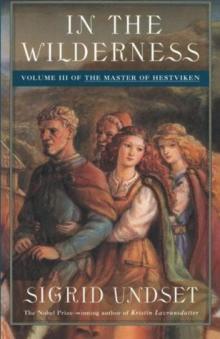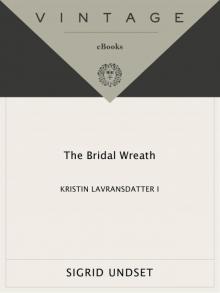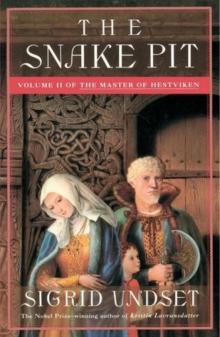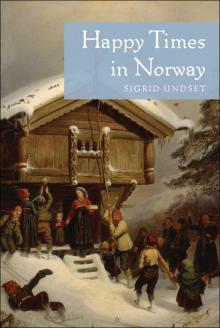- Home
- Sigrid Undset
Kristin Lavransdatter Page 81
Kristin Lavransdatter Read online
Page 81
But elsewhere it wasn’t customary for the women of the gentry on the large estates to go up to the pastures. Kristin knew that if she did so, people would be surprised and would gossip about it.
In God’s name, then, let them talk. No doubt they were already talking about her and her family.
Audun Torbergssøn owned nothing more than his weapons and the clothes on his back when he was wed to Ingebjørg Nikulaus-datter of Loptsgaard. He had been a groom for the bishop of Hamar. It was back when the bishop came north to consecrate the new church that Ingebjørg suffered the misfortune. Nikulaus Sigurds søn took it hard at first, swearing by God and man that a stableboy would never be his son-in-law. But Ingebjørg gave birth to twins, and people said with a laugh that Nikulaus evidently thought it would be too much to support them on his own. He allowed his daughter to marry Audun.
This happened two years after Kristin’s wedding. It had not been forgotten, and people probably still thought of Audun as a stranger to the region; he was from Hadland, of good family, but his lineage had become quite impoverished. And the man himself was not well liked in Sil; he was obstinate, hardheaded, and slow to forget either bad or good, but he was a most enterprising farmer, with a fair knowledge of the law. In many ways Audun Torbergssøn was now a respected man in the parish and a man with whom people were loath to become foes.
Kristin thought about Audun’s broad, tanned face with the thick, curly red hair and beard and those sharp, small blue eyes of his. He looked like many other men she had seen; she had seen such faces among their servants at Husaby, among Erlend’s men and ship’s crew.
She sighed. It must be easier for such a man to assert himself as he sat there on his wife’s ancestral estate since he had never ruled over anything else.
All winter and spring Kristin spent time talking to Frida Styrkaarsdatter, who had come with them from Trøndelag and was in charge of all her other maids. Again and again she would tell the woman that such and such was the way they did things here in the valley during the summer, this was what the haymakers were used to getting, and this was how things were done at harvest time. Surely Frida must remember how Kristin had done things the year before. For she wanted everything on the manor to be just as it was during Ragnfrid Ivarsdatter’s time.
But to come right out and say that she would not be there on the farm during the summer, that was hard for her to do. She had been the mistress of Jørundgaard for two winters and a summer, and she knew that if she went up to the mountain pastures now, it would be the same as running away.
She realized that Erlend was in a terribly difficult position. Ever since the days when he sat on his foster mother’s knee, he had never known anything other than that he was born to command and rule over everything and everyone around him. And if the man had allowed himself to be ruled and commanded by others, at least he had never been aware of this himself.
He couldn’t possibly feel the way he outwardly seemed. He must be unhappy here. She herself . . . Her father’s estate at the bottom of the quiet, closed-in valley, the flat fields along the curve of the gleaming river through the alder woods, the farms on the cultivated land far below at the foot of the mountain, and the steep slopes above, with the gray clefts against the sky overhead, pale slides of scree and the spruce forest and leafy woods clambering upward through the meadows from the valley—no, this no longer seemed to her the most beautiful and safest home in the world. It felt closed off. Surely Erlend must think that it was ugly and confining and unpleasant.
But no one could tell anything from his appearance except that he seemed content.
On the day when they let out the livestock at Jørundgaard, she finally managed to speak of it, in the evening as they ate their supper. Erlend was picking through the fish platter in search of a good piece; in surprise he sat there with his fingers in the dish while he stared at his wife. Then Kristin added quickly that it was mostly because of the throat ailment that was rampant among the children in the valley. Munan wasn’t strong; she wanted to take him and Lavrans along with her up to the mountains.
Well, said Erlend. In that case it would be advisable for Ivar and Skule to go with her too.
The twins leaped up from the bench. During the rest of the meal they both chattered at once. They wanted to go with Erling, who would be camping north among the Gray Peaks with the sheep. Three years before, the sheepherders from Sil had caught a poacher and killed him near his stone hut in the Boar Range; he was a man who had been banished to the forest from ster Ødal. As soon as the servants got up from the table, Ivar and Skule brought into the hall all the weapons they owned and sat down to tinker with them.
A little later that evening Kristin set off southward with Simon Andressøn’s daughters and her own sons Gaute and Lavrans. Arngjerd Simonsdatter had been at Jørundgaard most of the winter. The maiden was now fifteen years old, and one day during Christmas at Formo, Simon had mentioned that Arngjerd ought to learn something more than what they could teach her at home; she was just as skilled as the serving maids. Kristin had then offered to take the girl home with her and teach her as best she could, for she could see that Simon dearly loved his daughter and worried a great deal about her future. And the child needed to learn other ways than those practiced at Formo. Since the death of his wife’s parents Simon Andressøn was now one of the richest men in the region. He managed his properties with care and good sense, and he oversaw the farm work at Formo with zeal and intelligence. But indoors things were handled poorly; the serving women were in charge of everything. Whenever Simon noticed that the disarray and slovenliness in the house had surpassed all bounds, he would hire one or two more maids, but he never spoke of such things to his wife and seemed neither to wish nor to expect that she should pay more attention to the housekeeping. It was almost as if he didn’t yet consider her to be fully grown up, but he was exceedingly kind and amenable toward Ramborg and was constantly showering her and the children with gifts.
Kristin grew fond of Arngjerd after she got to know her. The maiden was not pretty, but she was clever, gentle, good-hearted, nimble-fingered, and diligent. When the young girl accompanied her around the house or sat by her side in the weaving room in the evenings, Kristin often thought that she wished one of her own children had been a daughter. A daughter would spend more time with her mother.
She was thinking about that on this evening as she led Lavrans by the hand and looked at the two children, Gaute and Arngjerd, who were walking ahead of her along the road. Ulvhild was running about, stomping through the brittle layer of nighttime ice on the puddles of water. She was pretending to be some kind of animal and had turned her red cloak around so that the white rabbit fur was on the outside.
Down in the valley in the dusk the shadows were deepening across the bare brown fields. But the air of the spring evening seemed sated with light. The first stars were sparkling, wet and white, high up in the sky, where the limpid green was turning blue, moving toward darkness and night. Above the black rim of the mountains on the other side of the valley a border of yellow light still lingered, and its glow lit up the scree covering the steep slope that towered above them as they walked. At the very top, where the snowdrifts jutted out over the ridges, the snow glistened, and underneath glittered the glaciers, which gave birth to the streams rushing and splashing everywhere down through the scree. The sound of water completely filled the air of the countryside; from below reverberated the loud roar of the river. And the singing of birds came from the groves and leafy shrubbery on all sides.
Once Ulvhild stopped, picked up a stone, and threw it toward the sound of the birds. Her big sister grabbed her arm, and she walked on calmly for a while. But then she tore herself away and ran down the hill until Gaute shouted after her.
They had reached the place where the road headed into the forest; from the thickets came the ringing of a steel bow. Inside the woods snow lay on the ground, and the air smelled cold and fresh. A little farther on, in a small clearing, stood E
rlend with Ivar and Skule.
Ivar had taken a shot at a squirrel; the arrow was stuck high up in the trunk of a fir tree, and now he was trying to get it down. He pitched stone after stone at it; the huge mast tree resonated when he struck the trunk.
“Wait a minute. I’ll try to see if I can shoot it down for you,” said his father. He shook his cape back over his shoulders, placed an arrow in his bow, and took aim rather carelessly in the uncertain light among the trees. The string twanged; the arrow whistled through the air and buried itself in the tree trunk right next to the boy’s. Erlend took out another arrow and shot again; one of the two arrows sticking out of the tree clattered down from branch to branch. The shaft of the other one had splintered, but the point was still embedded in the tree.
Skule ran into the snow to pick up the two arrows. Ivar stood and stared up at the treetop.
“It’s mine—the one that’s still up there, Father! It’s buried up to the shaft. That was a powerful shot, Father!” Then he proceeded to explain to Gaute why he hadn’t hit the squirrel.
Erlend laughed softly and straightened his cape. “Are you going to turn back now, Kristin? I’m setting off for home; we’re planning to go after wood grouse early in the morning, Naakkve and I.”
Kristin told him briskly no, that she wanted to accompany the maidens to their manor. She wanted to have a few words with her sister tonight.
“Then Ivar and Skule can go with Mother and escort her home if I can stay with you, Father,” said Gaute.
Erlend lifted Ulvhild Simonsdatter up in his arms in farewell. Because she was so pretty and pink and fresh, with her brown curls under the white fur hood, he kissed her before he set her back down and then turned and headed for home with Gaute.
Now that Erlend had nothing else to occupy him, he was always in the company of a few of his sons. Ulvhild took her aunt’s hand and walked on a bit; then she started running again, rushing in between Ivar and Skule. Yes, she was a beautiful child, but wild and unruly. If they had had a daughter, Erlend would have no doubt taken her along and played with her too.
At Formo Simon was alone in the house with his little son when they came in. He was sitting in the high seat1 in the middle of the long table, looking at Andres. The child was kneeling on the outer bench and playing with several old wooden pegs, trying to make them stand on their heads on the table. As soon as Ulvhild saw this, she forgot about greeting her father. She climbed right up onto the bench next to her brother, grabbed him by the back of the neck, and pounded his face against the table while she screamed that they were her pegs; Father had given them to her.
Simon stood up to separate the children; then he happened to knock over a little pottery dish standing near his elbow. It fell to the floor and shattered.
Arngjerd crawled under the table and gathered up the pieces. Simon took them from her and looked at them, greatly dismayed. “Your mother is going to be angry.” It was a pretty little flower-painted dish made of shiny white ceramic that Sir Andres Darre had brought home from France. Simon explained that Helga had inherited it, but she had given it to Ramborg. The women considered it a great treasure. At that moment he heard his wife out in the entryway, and he hid his hands, holding the pottery shards, behind his back.
Ramborg came in and greeted her sister and nephews. She took off Ulvhild’s cloak, and the maiden ran over to her father and clung to him.
“Look how fine you are today, Ulvhild. I see that you’re wearing your silver belt on a workday.” But he couldn’t hug the child because his hands were full.
Ulvhild shouted that she had been visiting her aunt Kristin at Jørundgaard; that was why Mother had dressed her so nicely in the morning.
“Yes, your mother keeps you dressed so splendid and grand; they could set you up on the shrine on the north side of the church, the way you look,” said Simon, smiling. The only work Ramborg ever did was to sew garments for her daughter; Ulvhild was always magnificently clothed.
“Why are you standing there like that?” Ramborg asked her husband.
Simon showed her the pottery pieces. “I don’t know what you’re going to say about this—”
Ramborg took them from him. “You didn’t have to stand there looking like such a fool because of this.”
Kristin felt ill at ease as she sat there. It was true that Simon had looked quite ridiculous as he stood there hiding the broken pieces in such a childish manner, but Ramborg didn’t need to mention it.
“I expected you to be mad because your dish was broken,” said her husband.
“Yes, you always seem to be so afraid that something will make me mad—and something so frivolous,” replied Ramborg. And the others saw that she was close to tears.
“You know quite well, Ramborg, that’s not the only way I act,” said Simon. “And it’s not just frivolous things either . . .”
“I wouldn’t know,” replied his wife in the same tone of voice. “It has never been your habit, Simon, to talk to me about important matters.”
She turned on her heel and walked toward the entryway. Simon stood still for a moment, staring after her. When he sat down, his son Andres came over and wanted to climb onto his father’s lap. Simon picked him up and sat there with his chin resting on the child’s head, but he didn’t seem to be listening to the boy’s chatter.
After a while Kristin ventured, a little hesitantly, “Ramborg isn’t so young anymore, Simon. Your oldest child is already seven winters old.”
“What do you mean?” asked Simon, and it seemed to her that his voice was unnecessarily sharp.
“I mean nothing more than that . . . perhaps my sister thinks you find her too young to . . . maybe if you could try to let her take charge of things more here on the estate, together with you.”
“My wife takes charge of as much as she likes,” replied Simon heatedly. “I don’t demand that she do more than she wants to do, but I’ve never refused to allow Ramborg to manage anything here at Formo. If you think otherwise, then it’s because you don’t know—”
“No, no,” said Kristin. “But it has seemed to me, brother-in-law, that now and then you don’t consider Ramborg to be any older than when you married her. You should remember, Simon—”
“You should remember—” he set the child down and jumped to his feet—“that Ramborg and I came to an agreement; you and I never could.” His wife came into the room at that moment, carrying a container of ale for the guests. Simon quickly went over to her and placed his hand on her shoulder. “Did you hear that, Ramborg? Your sister is standing here saying that she doesn’t think you’re happy with your lot.” He laughed.
Ramborg looked up; her big dark eyes glittered strangely. “Why is that? I got what I wanted, just as you did, Kristin. If we two sisters can’t be happy, then I don’t know . . .” And she too laughed.
Kristin stood there, flushed and angry. She refused to accept the ale bowl. “No, it’s already late; time for us to head back home now.” And she looked around for her sons.
“Oh no, Kristin!” Simon took the bowl from his wife and drank a toast. “Don’t be angry. You shouldn’t take so much to heart every word that falls between the closest kin. Sit down for a while and rest your feet and be good enough to forget it if I’ve spoken to you in any way that I shouldn’t have.”
Then he said, “I’m tired,” and he stretched and yawned. He asked how far they had gotten with the spring farm work at Jørundgaard. Here at Formo they had plowed up all the fields north of the manor road.
Kristin left as soon as she thought it was seemly. No, Simon didn’t need to accompany her, she said when he picked up his hooded cape and axe; she had her big sons with her. But he insisted and also asked Ramborg to walk along with them, at least up through the fenced fields. She didn’t usually agree to this, but tonight she went with them all the way up to the road.
Outdoors the night was black and clear with glittering stars. The faint, warm and pleasant smell of newly manured fields gave a springtime odo
r to the night frost. The sound of water was everywhere in the darkness around them.
Simon and Kristin walked north; the three boys ran on ahead. She could sense that the man at her side wanted to say something, but she didn’t feel like making it easier for him because she was still quite furious. Of course she was fond of her brother-in-law, but there had to be a limit to what he could say and then brush aside afterward—as merely something between kinsmen. He had to realize that because he had stood by them so loyally during their troubles, it wasn’t easy for her when he grew quick-tempered or rude. It was difficult for her to take him to task. She thought about the first winter, not long after they had arrived in the village. Ramborg had sent for her because Simon lay in bed with boils in his throat and was terribly ill. He suffered from this ailment now and then. But when Kristin arrived at Formo and went in to see the man, he refused to allow her to touch him or even look at him. He was so irate that Ramborg, greatly distressed, begged her sister’s forgiveness for asking her to come. Simon had not been any kinder toward her, she said, the first time he fell ill after they were married and she tried to nurse him. Whenever he had throat boils, he would retreat to the old building they called the Saemund house, and he couldn’t stand to have anyone near him except for a horrid, filthy, and lice-ridden old man named Gunstein, who had served at Dyfrin since before Simon was born. Later Simon would no doubt come to see his sister-in-law to make amends. He didn’t want anyone to see him when he was ill like that; he thought it such a pitiful shortcoming for a full-grown man. Kristin had replied, rather crossly, that she didn’t understand—it was neither sinful nor shameful to suffer from throat boils.

 In the Wilderness
In the Wilderness The Bridal Wreath
The Bridal Wreath Catherine of Siena
Catherine of Siena Marta Oulie: A Novel of Betrayal
Marta Oulie: A Novel of Betrayal The Snake Pit
The Snake Pit The Axe
The Axe Happy Times in Norway
Happy Times in Norway The Son Avenger
The Son Avenger Kristin Lavransdatter
Kristin Lavransdatter